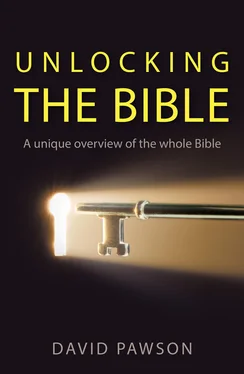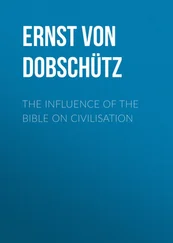As far as the whole Bible is concerned, therefore – including Genesis – we must assume God is there and that he wants us to find him, know him, love him and serve him. Then we see what happens on the basis of this trust. We cannot prove whether God exists or not, but we can hold the basic belief that God wants us to know him and have faith in him.
A picture of the creator
Moving on from the first four words of the book, we come to a feature that may be surprising: the subject of Genesis 1 is not creation but the creator. It is not primarily about how our world came to be, but about who made it come to be. In fact, in just 31 verses the word ‘God’ appears 35 times, as if to underline that this is all about him. It is not so much the story of creation as a picture of the creator. So what does this picture tell us?
1. GOD IS PERSONAL
Genesis 1 depicts a personal God. He has a heart that feels. He has a mind that thinks and can speak his thoughts. He has a will and makes decisions and sticks to them. All this forms what we know as a personality. God is not an it, God is a he. He is a full person with feelings, thoughts and motives like us.
2. GOD IS POWERFUL
It is quite evident that if God can speak things into being by his Word, he must be enormously powerful. In all he gives 10 ‘commandments’ in the first chapter, and every one is fulfilled just as he desires.
3. GOD IS UNCREATED
We have already noted that God is and always was there. He was always the Creator, never a creature.
4. GOD IS CREATIVE
What an imagination he must have! What an artist! Six thousand varieties of beetle. No two blades of grass the same. No two snowflakes. No two clouds. No two grains of sand. No two stars. An astonishing variety, yet in harmony. It is a uni-verse.
5. GOD IS ORDERLY
There is a symmetry in his work of creation, as we shall see. The fact that creation is mathematical has made science possible.
6. GOD IS SINGULAR
The verbs in Genesis 1, from ‘created’ onwards, are all singular.
7. GOD IS PLURAL
The word used for ‘God’ is not the singular El, but the plural Elohim, which means three or more ‘gods’. So the very first sentence in the Bible, using a plural noun with a singular verb, is grammatically wrong but theologically right, hinting at a God who is ‘Three-in-one’.
8. GOD IS GOOD
Therefore all his work is ‘good’ and he pronounces human beings as his best, his masterpiece, ‘very good’. Furthermore, he wants to be good to all his creation, to ‘bless’ it. His goodness sets the standard for all goodness.
9. GOD IS LIVING
He is active in the world of time and space.
10. GOD IS A COMMUNICATOR
He speaks to creation and the creatures within it. In particular he wants to relate to human beings.
11. GOD IS LIKE US
We are made in his image, so we must be in some ways like him and he must be like us.
12. GOD IS UNLIKE US
He can ‘create’ out of nothing (ex nihilo), whereas we can only ‘make’ something out of something else. We are ‘manufacturers’; he is the only Creator.
13. GOD IS INDEPENDENT
God is never identified with his creation. There is a distinction between creator and creation from the very beginning. The New Age movement confuses this idea by suggesting that somehow ‘god’ is part of us. But the creator is separate from his creation. He can take a day off and be quite apart from all that he has made. We must never identify him with what he has made. To worship his creation is idolatry. To worship the creator is the truth.
Philosophies challenged
If we accept the truth of Genesis 1, then a number of alternative viewpoints about God are automatically ruled out. These viewpoints could also be called philosophies (the word ‘philosophy’ means ‘love of wisdom’). Everyone has their own way of looking at the world, whether they consciously think about it or not.
If you believe Genesis, the following philosophies will not stand.
1 Atheism. Atheists believe there is no God. Genesis 1 confirms there is.
2 Agnosticism. Agnostics say they do not know whether there is a God or not. Genesis 1 says we accept that there is.
3 Animism. This is the belief that many spirits control the world – spirits of rivers, spirits of mountains, etc. Genesis 1 asserts that God created and controls the world.
4 Polytheism. Polytheists believe there are many gods. Hindus would be in this category. Genesis 1 states there is just one.
5 Dualism. This is the belief that there are two gods, one good and one bad, with the good god responsible for the good things that happen and the bad god for the bad things. Genesis 1 asserts that there is just one God, who is good.
6 Monotheism. This is the belief of Judaism and Islam – that there is one God, and just one person, thus rejecting God as a trinity. By using the word Elohim to describe God, Genesis 1 tells us that there is one God in three persons.
7 Deism. Deists see God as the creator, but argue that he cannot now control what he has created. He is like a watchmaker who has wound up the world and lets it run on its own laws. As such God never intervenes in his world, and miracles are impossible. Many Christians are, for all practical purposes, deists.
8 Theism. Theists believe that God not only created the world but is also in control of everything and everyone he has made. Theism is one step towards the biblical philosophy, but does not in fact go far enough.
9 Existentialism. This is a popular philosophy today, where experience is believed to be God. Our choices and our own affirmation of ourselves is the ‘religion’ followed. There is no creator as in Genesis 1 to whom we have to give an account.
10 Humanism. Humanists reject the concept of a god outside the created world. Although Genesis 1 tells us that man is created by God, humanists believe that man is God.
11 Rationalism. Rationalists believe that our own reason is God, rejecting the indication in Genesis that the powers of reason were given when God created man in his image.
12 Materialism. Materialists believe that only matter is real and do not accept anyone or anything they cannot see for themselves.
13 Mysticism. In contrast to materialism, mystics believe that only spirit is real.
14 Monism. This philosophy underpins much of the New Age movement. It holds that matter and spirit are essentially one and the same thing. The idea of God as an independent spirit creating the world is thus ruled out of court.
15 Pantheism. This idea is similar to monism, in that everything is believed to be God. A modern version of it is called Panentheism: God in everything.
In contrast to all these philosophies, the biblical viewpoint could be called Triunetheism: God is three in one, creator and controller of the universe. This is the biblical way of thinking which comes right out of Genesis 1 and continues through to the last chapter of Revelation.
Style
Let us move on to look more closely at the text of Genesis 1 and in particular the style of the chapter. The obvious point to make is that it is not written in scientific language. Many people seem to approach the chapter expecting the detail of a scientific textbook. Instead it is written very simply, so that every generation can understand it, whatever the standard of their scientific learning.
The account uses only very simple categories. Vegetation is divided into three groups: grass, plants and trees. Animal life also has three categories: domesticated animals, animals hunted for food and wild animals. These simple classifications are understood by everybody everywhere.
WORDS
This simple style is also demonstrated in the words used. There are only 76 separate root words in the whole of Genesis 1. Furthermore, every one of those words is to be found in every language on earth, which means that Genesis 1 is the easiest chapter to translate in the whole Bible.
Читать дальше











